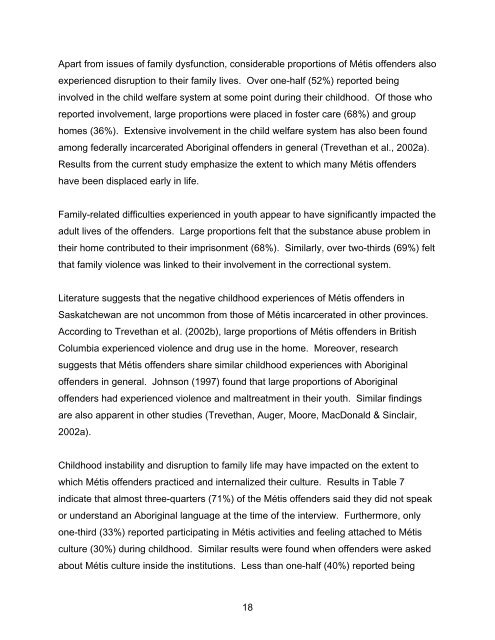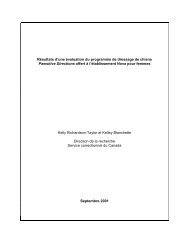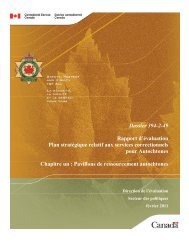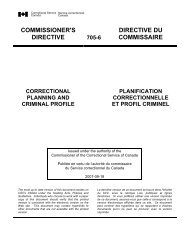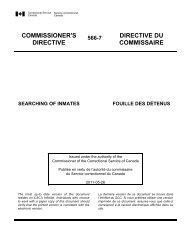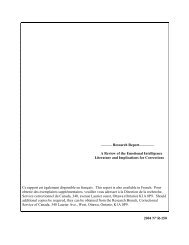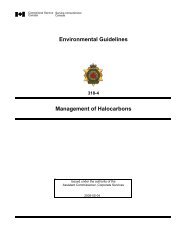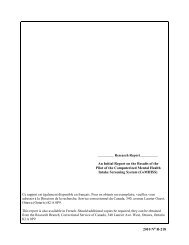Program and Service Needs of Federally Incarcerated Métis ...
Program and Service Needs of Federally Incarcerated Métis ...
Program and Service Needs of Federally Incarcerated Métis ...
You also want an ePaper? Increase the reach of your titles
YUMPU automatically turns print PDFs into web optimized ePapers that Google loves.
Apart from issues <strong>of</strong> family dysfunction, considerable proportions <strong>of</strong> <strong>Métis</strong> <strong>of</strong>fenders also<br />
experienced disruption to their family lives. Over one-half (52%) reported being<br />
involved in the child welfare system at some point during their childhood. Of those who<br />
reported involvement, large proportions were placed in foster care (68%) <strong>and</strong> group<br />
homes (36%). Extensive involvement in the child welfare system has also been found<br />
among federally incarcerated Aboriginal <strong>of</strong>fenders in general (Trevethan et al., 2002a).<br />
Results from the current study emphasize the extent to which many <strong>Métis</strong> <strong>of</strong>fenders<br />
have been displaced early in life.<br />
Family-related difficulties experienced in youth appear to have significantly impacted the<br />
adult lives <strong>of</strong> the <strong>of</strong>fenders. Large proportions felt that the substance abuse problem in<br />
their home contributed to their imprisonment (68%). Similarly, over two-thirds (69%) felt<br />
that family violence was linked to their involvement in the correctional system.<br />
Literature suggests that the negative childhood experiences <strong>of</strong> <strong>Métis</strong> <strong>of</strong>fenders in<br />
Saskatchewan are not uncommon from those <strong>of</strong> <strong>Métis</strong> incarcerated in other provinces.<br />
According to Trevethan et al. (2002b), large proportions <strong>of</strong> <strong>Métis</strong> <strong>of</strong>fenders in British<br />
Columbia experienced violence <strong>and</strong> drug use in the home. Moreover, research<br />
suggests that <strong>Métis</strong> <strong>of</strong>fenders share similar childhood experiences with Aboriginal<br />
<strong>of</strong>fenders in general. Johnson (1997) found that large proportions <strong>of</strong> Aboriginal<br />
<strong>of</strong>fenders had experienced violence <strong>and</strong> maltreatment in their youth. Similar findings<br />
are also apparent in other studies (Trevethan, Auger, Moore, MacDonald & Sinclair,<br />
2002a).<br />
Childhood instability <strong>and</strong> disruption to family life may have impacted on the extent to<br />
which <strong>Métis</strong> <strong>of</strong>fenders practiced <strong>and</strong> internalized their culture. Results in Table 7<br />
indicate that almost three-quarters (71%) <strong>of</strong> the <strong>Métis</strong> <strong>of</strong>fenders said they did not speak<br />
or underst<strong>and</strong> an Aboriginal language at the time <strong>of</strong> the interview. Furthermore, only<br />
one-third (33%) reported participating in <strong>Métis</strong> activities <strong>and</strong> feeling attached to <strong>Métis</strong><br />
culture (30%) during childhood. Similar results were found when <strong>of</strong>fenders were asked<br />
about <strong>Métis</strong> culture inside the institutions. Less than one-half (40%) reported being<br />
18


